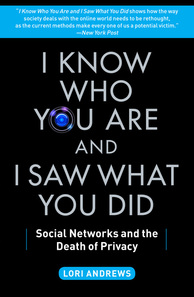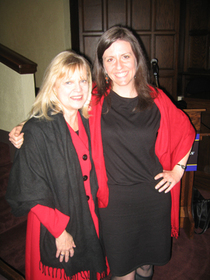Lori Andrews, author of I Know Who You Are and I Saw What You Did: Social Networks and the Death of Privacy, asks:
|
How many things did you reveal about yourself online today? Your opinion of a colleague? Your credit card number? Your photos from last night? These activities are common, but where does the information we post—even on what seem to be the most private or friendly of forums—truly go? As many individuals have already learned the hard way, the same power of information sharing that can topple governments can also topple a person’s career, marriage, finances, or even his or her future.
In her new book, Lori Andrews explores how our digital identities on the Web—email, personal websites, and social media pages—are starting to overshadow our physical identities. How can you protect the privacy of your digital self? Lori’s book shows how people can fight back when what they post on social networks is used against them. She also ignites a battle for further protections, from a right to connect to a right to privacy, and proposes a Social Network Constitution to protect us all. |
Op-Eds
- Read Lori's Op ed on Internet Privacy in the Chicago Tribune, 2014.
- Facebook Is Using You, The New York Times, 2012.
Books and Reviews:
Praise for Lori's book...
|
Rebecca Skloot, author of The Immortal Life of Henrietta Lacks, says:
“Lori Andrews is a privacy pioneer - she was warning the world about the importance of genetic privacy and fighting to protect it long before most people even understood what DNA was. With I Know Who You Are And I Saw What You Did she is once again on the cutting edge of a critical privacy issue facing us all. We should pay attention: The stories she recounts are shocking and important - essential reading for anyone who has ever used Facebook, Twitter, or any other social network.” |
Kirkus Reviews says:

“Unnerving narrative about the misuse of personal online information—without our knowledge—to track, judge and harm us in innumerable aspects of our lives.
Social-network executives often dismiss online privacy concerns: ‘You have zero privacy anyway. Get over it,’ said Sun Microsystems’ Scott McNealy. But the constitutional freedoms of millions of people posting personal data on Facebook and other networks are violated routinely, and the law has not kept up with the new technology, writes lawyer Andrews (Institute for Science, Law and Technology/Illinois Institute of Technology; Immunity, 2008, etc.). Noting that social networks make their profits on users’ data, she describes the multibillion-dollar industry of data aggregators who mine online data for the advertising industry, often ‘weblining’ people, denying them certain opportunities due to observations about their digital selves. Most users have no idea how much information is being collected about them: ‘People have a misplaced trust that what they post is private.’ The results can be devastating: A Georgia teacher posted a photo showing her drinking a glass of Guinness at an Irish brewery, and she was forced to resign after the photo was e-mailed anonymously to her school superintendent. After seeing a mother’s MySpace page showing her posing provocatively in lingerie, a judge awarded custody of her young children to her husband. ‘Virtually every interaction a person has in the offline world can be tainted by social network information,’ writes the author, who proposes creating a ‘Social Network Constitution’ to govern our lives online. Her governing principles would protect against police searches of social networks without probable cause, require social networks to post conspicuous Miranda-like privacy warnings and set rules for the use or collecting of user information.
Authoritative, important reading for policymakers and an unnerving reminder that anything you post can and will be used against you.”
Social-network executives often dismiss online privacy concerns: ‘You have zero privacy anyway. Get over it,’ said Sun Microsystems’ Scott McNealy. But the constitutional freedoms of millions of people posting personal data on Facebook and other networks are violated routinely, and the law has not kept up with the new technology, writes lawyer Andrews (Institute for Science, Law and Technology/Illinois Institute of Technology; Immunity, 2008, etc.). Noting that social networks make their profits on users’ data, she describes the multibillion-dollar industry of data aggregators who mine online data for the advertising industry, often ‘weblining’ people, denying them certain opportunities due to observations about their digital selves. Most users have no idea how much information is being collected about them: ‘People have a misplaced trust that what they post is private.’ The results can be devastating: A Georgia teacher posted a photo showing her drinking a glass of Guinness at an Irish brewery, and she was forced to resign after the photo was e-mailed anonymously to her school superintendent. After seeing a mother’s MySpace page showing her posing provocatively in lingerie, a judge awarded custody of her young children to her husband. ‘Virtually every interaction a person has in the offline world can be tainted by social network information,’ writes the author, who proposes creating a ‘Social Network Constitution’ to govern our lives online. Her governing principles would protect against police searches of social networks without probable cause, require social networks to post conspicuous Miranda-like privacy warnings and set rules for the use or collecting of user information.
Authoritative, important reading for policymakers and an unnerving reminder that anything you post can and will be used against you.”
Library Journal says:

"Bioethicist and biotechnology expert Andrews (law, Illinois Inst. of Technology; The Silent Assassin) delivers a broad-based exposé of the ramifications of the increasingly blurry boundary between our private and public selves. The social networking innovations championed by analysts like Jeff Jarvis (Public Parts) are rejected outright given the extremely rudimentary stage in which social networking currently exists. People have very little security and privacy and are easy pickings for individuals, corporations, or groups wishing to profit from their personal data, information, and media. Andrews presents a litany of cases that have made headlines almost daily over the past few years in an effort to connect the dots between individual stories and the big picture—human rights violations—that so alarms her. The writing is attention-grabbing and fully relatable. While the technological question of how is answered, most of the book focuses on why recent uncontrolled changes in privacy are altering power relations in society. She proposes a necessary, new constitution for the Internet.
Verdict: Essential reading for anyone with a social media and networking service account."
Verdict: Essential reading for anyone with a social media and networking service account."
Watch Lori’s videos and vote on the Social Network Constitution. Also, write to Lori to tell her how Facebook, Myspace, YouTube, Twitter, LinkedIn or other social networks have affected your life. Has anything you posted come back to haunt you?

